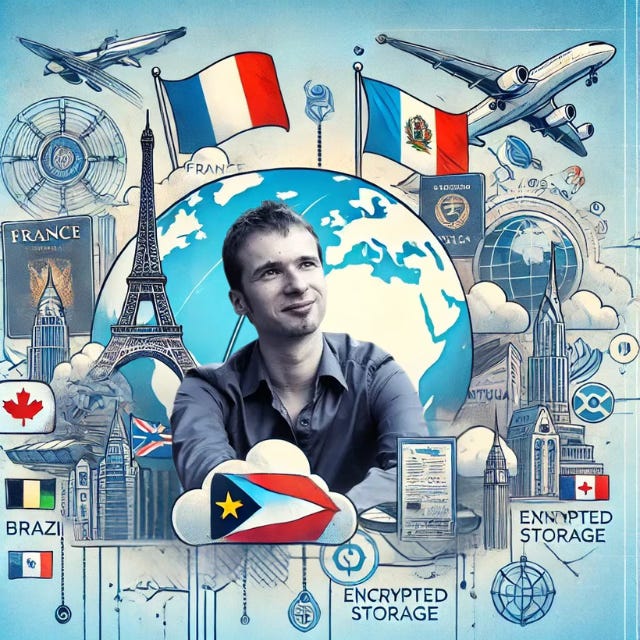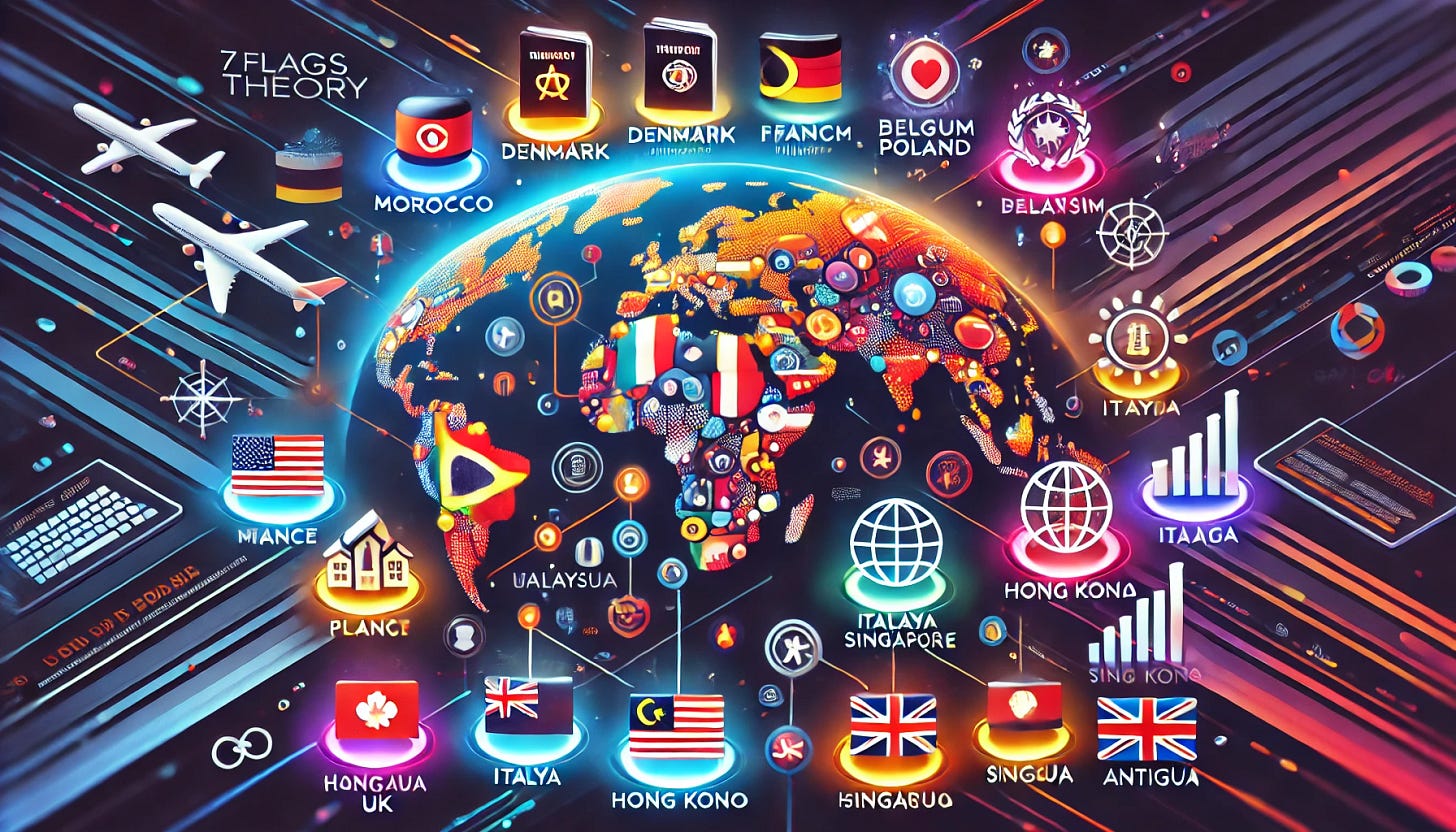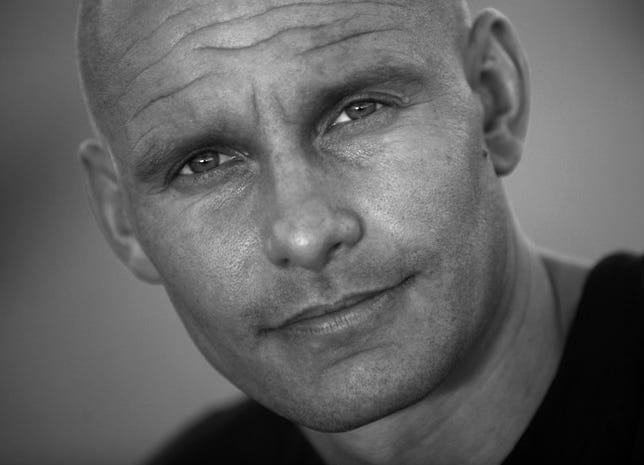How to Implement The 7 Flags
Real life examples to reduce your taxes and be freer
Note: this is part 3 of a series on how to go further by integrating asymmetrical defenses against overeager states.
Here are the 2 articles in the series:
Having seen the 7 flags theory in the previous article, let's look at some real-life examples of people applying it in real life.
(I don't specify the countries of the bank accounts, but all these people have several in different countries)
Kamal's example

Let's take the example of Kamal, given in this article, in the light of the seven flags:
Country of nationality: Morocco.
Where he goes regularly, but only for a short time each year, and where he has no business or investment.
Country of residence: Poland
Where he spends much of the year
Main business country: Poland for his company
But his customers are mainly in French-speaking countries. He has no customers in Poland
Playground country: the rest of the world
Where Kamal travels regularly for a few months each year
Countries of investment: many, all over the world
Country of digital assets
Its sites are not hosted in Poland, Morocco or French-speaking countries.
He doesn't particularly use end-to-end encrypted services
We see here the example of someone who doesn't consciously follow the seven flags, but who, through his lifestyle, applies a good part of them naturally, enabling him to have an extremely correct asymmetrical defense for an absolutely negligible investment of time and energy (which is the very essence of asymmetry).
The example of Jean
Jean is an expert in web entrepreneurship and real estate, and earns his living from two major pillars: 1) selling training and consulting on these subjects, and 2) from his investments.
Country of nationality: France.
Where he goes regularly, but only for a short time each year, and where he has no business.
Country of residence: Italy
Where he spends much of the year with his wife and two children
Main country of business : Singapore for his company, managed by a local manager
But his customers are mainly in French-speaking countries. He has virtually no customers in Italy, and even fewer in Singapore.
Playground country: the rest of the world
Where Jean travels regularly for a few months a year
Countries of investment: in many countries around the world, but Jean also owns a real estate empire in France.
Country of digital assets
Its sites are not hosted in Italy, Singapore or French-speaking countries.
He doesn't particularly use end-to-end encrypted services
Jean is a little more conscious in his strategy of using the seven flags than Kamal: he has placed his business (with a manager) elsewhere, even though he also owns a real estate empire in his native country.
In the end, his asymmetrical defense is also excellent, and takes up very little of his time, which is part of his lifestyle.
(I've changed some details for this example, including the first name, but I know "John" personally and this gives you a good idea of his general organization).
The example of Stig Severinsen
Stig is a doctoral student in medicine, famous for being a four-time world champion freediver and holder of several Guinness World Records.
He sells breathing improvement courses to a public ranging from top athletes to entrepreneurs wishing to improve their performance, as well as online training courses on the subject.
He's a personal friend of mine and I know his organization well, which is roughly as follows (I share this with his permission) :
Country of nationality: Denmark.
Where he goes regularly, but only for a short time each year, and where he has no business. He owns a vacation home there with horses.
Countries of residence: Malaysia, Mexico, Spain, Dubai.
He is a tax resident in Malaysia and owns second homes in Mexico and Spain.
Main country of business : Hong-Kong.
His customers are mainly in the English-speaking world. He has zero customers in Hong Kong
Playground country: the rest of the world
Stig is a keen traveller and spends many months in different countries.
Countries of investment: in many countries around the world. Not much in his native country
Country of digital assets
Its sites are not hosted in Denmark or Malaysia, its official residence.
He doesn't particularly use end-to-end encrypted services
The example of Kévin
I met Kévin, a freelance developer, in Bali. His organization is as follows:
Country of nationality: Belgium.
Where he's got nothing and doesn't go much
Country of residence: Hong-Kong
It's a "paper" tax residence obtained when he was a student. He hardly ever sets foot there anymore, but keeps it, and uses it for his bank accounts and when he needs to "prove" where he lives.
Main country of business: His company is based in the UK.
This structure is taxed at 0% as long as it has no customers in the country (it doesn't).
His customers are all over the world, and he has a perfect command of English, so he's not limited to the French-speaking world.
Playground country: the rest of the world
Kévin is a digital nomad, and spends his time traveling wherever he wants.
Countries of investment: many, all over the world. He no longer owns anything in his native country.
Country of digital assets
He has no website of his own, and mainly uses LinkedIn, Upwork, Malt, and word-of-mouth to find customers.
He doesn't particularly use end-to-end encrypted services
What about my organization?

Here's roughly how I'm organized:
Country of nationality: France.
I haven't lived there since 2015. I had a few apartments that I kept as rental investments, which I ended up selling off little by little. Today, I own nothing there.
I also have an Antigua passport, which I obtained after investing in its economic citizenship program, for reasons I share in this article (this is very optional for most of you).
Country of residence: Dubai
Where I spend a good part of the year, because I love this city.
With 9% corporate income tax (since 2024), 0% income tax, and 0% capital gains tax
Main country of business : Dubai
I'm not completely respecting the theory here, as you can see.
But I don’t have customers in the UAE
And I do have a few small businesses in other countries, both to diversify my risk and for specific services.
Playing field countries: worldwide
Travelling for about six months a year since 2011, I can say that it's a passion, and even a way of life.
I love discovering new countries all the time, but there are certain places I like to return to regularly: the Philippines, Portugal, Jericoacoara in Brazil (one of the best kitesurfing spots in the world), Marrakech, Istanbul...
I visit France every year, mainly to see friends and family, but taking a vacation there seems like a crazy idea: the world is so vast, the places to explore so innumerable, the cultures to discover so interesting and exotic...
Countries of investment: many, all over the world
I no longer own anything in my country of nationality
Country of my digital assets
Switzerland: email (with Proton Mail), hosting of some of my websites
Iceland: email, hosting other websites
United States: hosting certain websites
Canada: my files, stored on Sync.com, which works exactly like Dropbox, except that everything is end-to-end encrypted.
Coming soon
In the next article, we’ll see if you need to obtain a 2nd passport to take full advantage of the 7 flags, or if it's unnecessary.
Stay tuned ! In the meantime, feel free to follow Disruptive Horizons on X/Twitter & Linkedin, and join the tribe of Intelligent Rebels by subscribing to the newsletter :







When you say "Countries of investment: many, all over the world", do you mean many investment accounts over the world? One investment account already feels like a hassle.
I don't think Stig is still a doctoral student.